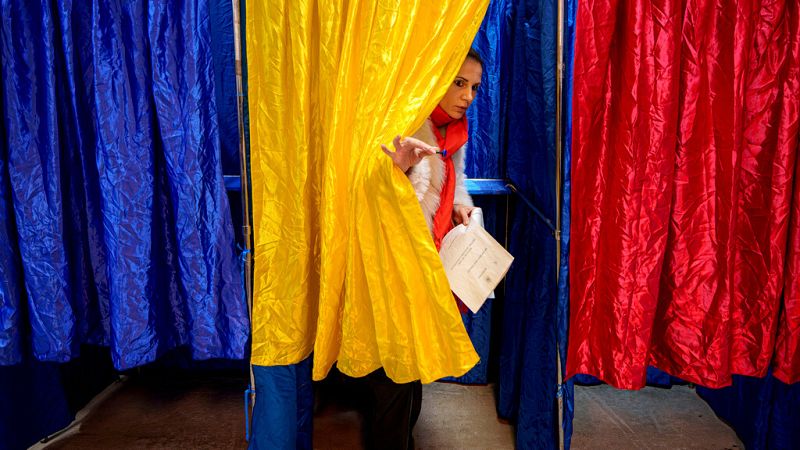Romania comes to terms with new political reality despite victory of pro-European forces

As Romania comes to terms with the new political reality that the country has changed, the calculations and negotiations are under way for government coalition scenarios following the victory of the pro-Western centrist forces and the rise of the far-right parties in Sunday’s parliamentary elections.
With 99% of the votes counted, the governing Social Democratic Party (PSD) are leading with 21% of the votes, followed by the nationalist far-right AUR with 18%. The two other main centrist forces and the Hungarian minority’s political party are enough for the pro-European forces to hold onto a majority, but two extreme far-right parties made it into parliament with around 7% of the votes each.
The voters have reaffirmed Romania’s pro-EU, pro-NATO and pro-Ukraine course, but the scores of the nationalist far-right parties show an unprecedented political polarisation.
The parliamentary election results arrive against the backdrop of the unexpected race for next Sunday’s presidential election showdown between two outsiders. The pro-European Elena Lasconi faces the ultra-nationalist Calin Georgescu, whose shock rise prompted a record turnout in Sunday’s parliamentary elections in what the pro-EU forces called a “national emergency” vote.
With Georgescu nowhere to be seen after Sunday’s vote, Lasconi went straight into the presidential race.
"I want to thank you for not playing Russian roulette with democracy in Romania and also with this sacred right to vote freely," she said.
"I am a firm supporter of the law and the constitution. God will help us this time to stand united, fight for democracy, and keep Russia out of our country," Lasconi added.
What are Romanians saying with their vote on Sunday?
A staunch pro-Western ally as NATO’s biggest Eastern flank country, the Romanian society has been inundated with intense anti-EU and anti-NATO narratives on social media, starting with the COVID-19 pandemic and culminating with Russia’s full-scale invasion of Ukraine, following the same anti-Western propaganda manual as seen across the EU over the last years.
A protest vote against the decades-long Romanian political establishment, combined with relentless anti-EU, pro-Kremlin political and public opinion vectors, has, over time, resulted in a shift towards more populist discourses.
“I think through Sunday's vote, Romanians wanted to send a clear message to their own politicians rather than to Europe. The significant increase in support for the extremists compared to 2020 shows that in Romania, there is a major social despondency (at play)," political analyst Adi Zabava told Euronews.
"Nevertheless, parts of Sunday's vote came from Romanians who wanted to defend their country's pro-EU stance, alarmed by the results in the first round of the presidential elections.”
“What is different this time? Heavy and smart social media campaigns targeting mind by mind," analyst Dan Carbunaru explained.
"Everybody knows the efforts that the EU, NATO and US made in terms of military mobilisation to assure what is going on the eastern flank of EU and NATO, but another war was going on in the meantime, and that was the war for the mind of the people," Carbunaru told Euronews.
"We saw what's going on with Brexit, for instance, in the UK. We see what is going on with the rising of anti-European populist and extremist movements in Europe. We can see it also in this ... European Parliament. So, it's a growing movement.”
While the composition of the next parliament shows that Romania will continue its pro-Western and pro-Ukraine strategy, the second round of the presidential elections next Sunday is now seen as a moment of truth for Romania’s political reality.
The result of the presidential race will be a significant factor in any future government formula and Romania’s overall political stability, with repercussions in the region and across the EU.
The leader of the Social Democrats refused to endorse the pro-European candidate Lasconi, saying Romanians must decide for themselves.
"Romanians, at this point, have issued a warning sign to the entire political class," Ciolacu said.
"We assume again to be a binding force in society, to be again a balancing factor and, as I said during the election campaign, to be the grown-up in the room at this moment," he added.
The fragmentation of the vote has prompted pro-Western parties to start discussing possible coalition options to form a government.
However, each possibility points to a ruling bloc that might not be perfectly stable.
In addition, a massive question mark remains over the results of the second round of presidential elections next Sunday, which is set to be a standoff between the ultra-nationalist Georgescu and the pro-Western Lasconi.
Yesterday

